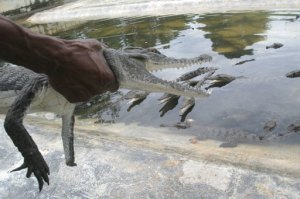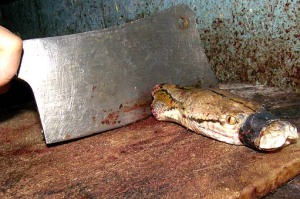"For the fate of the sons of men and the fate of the beasts is the same; as one dies, so dies the other; they all have the same breath, and man has no advantage over the beasts; for all is vanity. All go to one place; all are from dust, and all turn to dust again." Ecclesiastes, 3:19-20.
During my days at hospital I heard from their radio station that the infamous Hollywood's “Avatar” director has awarded our president Susilo Bambang Yudhoyono for his ambition to plant 10,000 trees across the nation by 2010; a campaign he takes personally by planting trees wherever he goes, while continuously ask his citizen to follow his “one person – one tree” campaign.
James Cameron in his note following the award, applauded President Yudhoyono for trying to combat the rapidly declining rain forest, mostly due to opening of palm oil plantation and resort centers. The president, in return, asked that larger or richer countries do their parts in saving our “home tree” the only earth we have, to sustain every lifeforms that roam above it.
His speech, as quoted by the radio host, brings my mind flowing back to my childhood days, singing an old folk song praising the fertility of our land , the beauty of our beaches, the abundance of our oceans, and the lush of our forests.
Indonesia, once own 20% of rain forest in the world, now is the country with fastest rate of deforestation (4% per year). The day when we boasted ourselves as “the lungs of earth” has long a history; And along with the forest, goes the animals who we once boasted as “the richest in variety”
The oceans and beaches are in no better condition. The bombing of coral reefs during fishing, the many pirates that roam freely to take our abundant resources, and the poisoning of water for fast harvesting had rob us our title “paradise on earth”
While the slogan is still used occasionally in tourism pamphlets or fliers, there will be no paradise if you are actually lived every corner of the country.
From remote areas to biggest cities, animals are abused, exploited, exhausted to their last existence, treated as some “thing” instead of some”one”.
Though itself bound under CITES (Convention on International Trade in Endangered Species of Wild Fauna and Flora) that stipulates that endangered species must not be traded, Indonesia doesn't have animal welfare law to protect its animal diversity.
By law (it was made on 1815), only licensed wildlife hunters and traders are allowed to capture and trade animal parts in Indonesia. In its investigations, however, PETA found most hunters did not have permits.
The Directorate General of Nature Conservancy and Forest Protection (PHKA) oversees the licensing and quotas for wildlife trade in Indonesia. PHKA director general Darori said his office provided permits to groups of snake skin collectors.
However, sequentially he told that “The ones who trap the snakes and lizards are villagers. They sell the skins to licensed collectors. It’s not possible for every single villager to obtain a permit”
Every year, his office releases a quota for the wildlife trade, based on recommendations from the Indonesia Institute of Sciences (LIPI). “LIPI checks whether there is an abundant stock or not. We’re bound to an international convention as well,” Darori said.
According to the PHKA data, the total quota for 2010 is 430,280 snakes; 413,100 monitor lizards, and 29,500 crocodiles, but the kill number is much higher on the streets.
A snake head is chopped off by a man in Tangerang, highlighting some of the gruesome killing occurring in five Indonesian cities. A National Geographic report states that Indonesia is Southeast Asia’s biggest exporter of wildlife, including live animals for pets and animal parts. Courtesy of PETA Asia Pacific

worker picks up a salt water crocodile (crocodylus porosus) at a crocodile breeding facility in Jayapura, Papua, on Friday. The facility is breeding some 7,500 crocodiles for their valuable skins to make leather products for export to countries such as Singapore, Japan and Italy. (Antara/Oka Barta)
When confronted with such fact, again, Darori, the director of Indonesia's natural conservatory said his office made sure animals were not tortured during the killings.
“So, when a snake’s head is cut off, it is not tortured,” he said. Laymen would torture snakes they encounter, out of fear, compared to professional hunters.
“Because the skin is what hunters are after, they do it swiftly so the skin is not damaged. Commoners would batter a snake with a stick if they found one,” he said.
In a more remote part of the country, a wealthy landlord in Medan can be seen bragging his crocodile farm, when piles of salt water or freshwater alligators been taken captive in filthy condition, piled up one on top of the other, stoically waiting to be slaughtered before their skin is exported to Hermes or other high brand fashion for bags, clothes, or shoes.
“So, when a snake’s head is cut off, it is not tortured,” he said. Laymen would torture snakes they encounter, out of fear, compared to professional hunters.
“Because the skin is what hunters are after, they do it swiftly so the skin is not damaged. Commoners would batter a snake with a stick if they found one,” he said.
In a more remote part of the country, a wealthy landlord in Medan can be seen bragging his crocodile farm, when piles of salt water or freshwater alligators been taken captive in filthy condition, piled up one on top of the other, stoically waiting to be slaughtered before their skin is exported to Hermes or other high brand fashion for bags, clothes, or shoes.

worker picks up a salt water crocodile (crocodylus porosus) at a crocodile breeding facility in Jayapura, Papua, on Friday. The facility is breeding some 7,500 crocodiles for their valuable skins to make leather products for export to countries such as Singapore, Japan and Italy. (Antara/Oka Barta)
Ironically, while major environmentalists were busy fighting for animal welfare for Indonesia, however, Darori (yes, the director of Indonesia's nature conservation) instead said that Indonesia’s local fashion industry should use animal parts and develop its own brands.
“We can make them as good as international brands. It’s just that our brands are not as big as international labels,” he said.
His statement sank in to me as the answer of why tiger skin, leopard's fur, elephant's ivory, and rhino's tusk were freely traded while the owner animal hunted to extinction.
If wildlife suffers so much, what about domesticated animals?
The answer is: not better.
Just like how the crocodiles lives solely as financial means of their owners, cats, dogs, rabbits, hamsters, birds, reptiles, are exploited to their tiniest being for their mater's maximum profit.
Here in Indonesia, it is the pet who feed the owner, not the other way around. The more exotic the breed, the more expensive, the higher the status of their owner and therefore, the more they can sell their pets.
What happened to the rest is a question of the strength of your gut. Cats are being crushed over, living goldfish thrown to the sewer, and because majority of Indonesian are Muslims who thinks dogs are unholy (haram) their fate is much worse.
Horses are often forced to carry harvests several times their own weight. The owner beating them to continue walking despite their foamy mouth, and when they are not strong enough to carry any more, mostly from malnutrition or sickness, they are sold to slaughter, or been butchered by the owner himself so they can catch another one.
Rabbits are breeding machines. The older ones were skinned for their fur, while their meat sold by the street as traditional barbecue.
So if anyone in ever said that one story of a murder of a dog 'heartbreaking', I have seen much worse in daily basis and most of the time, I can't do much because of financial and space limitation.
After being diagnoses with swollen liver and severe typhoid that require me to stay in the hospital for the whole month, however, the pressure of financial and space limitation is heavier than ever, more so because Indonesia also happen to be a country without social security, so I have to pay everything by myself.
Then what is it left for me to live on?
After all this years, after fighting for the entire 20 years of my life and dedicated each of my blood and tears for the welfare of abused and neglected animals, I have that right. I have that right to call it off, and return to my father's homeland: Japan. I have relatives who will take care of me, friends who eagerly await me, and I don't have to worry about financial restraint or spinning my head to meet my refugees' end.
But Japan has many underground animal advocates. My beloved whales had Pierce Brosnan and Paul Watson. Canada has Nigel Barker and Senator Mac Harb defending their seals, Australia, UK, even South Africa has their own fighters, but if I am to go, who will stand for Indonesia?
I dreamed of a small place, a tiny house for one or two person with a small garden where all the tired street cats or dog can just escape from their tiresome life for a while and rest while I took care of their wounds. I yearned of a tree where the birds doesn't have to fear of hunter's gun, I relentlessly prayed to give my whole service for those animals: conceived without sin (to human), but mortally paying with their life, dying on the streets of my homeland.
I consider my life worth nothing to me, if only I may finish this race and complete this task my Lord Jesus has given me – the task of testifying the gospel of God's grace – Acts 20:24
I do not know how I would live, with an empty wallet and zero saving account. I do not know how I would be able to continue feeding my refugees, or pay the vet bill.
My soul waits for the Lord, more than watchmen wait for the morning – Psalm 130:6
but I asked anyway, and I know that I will be answered.
But as for you, be strong and do not give up, for your work will be rewarded - 2 Chronicles 15:7
This is what my purpose that driven my life, the reason I am here, and the one thing I believe in.
Thus here I am again on the look of a good hand that will help me rock the cradle, to help me pass my day. Here I am again, on the street, during my quest to Canaan: the promised land, and I am inviting every caring heart to join me on the pilgrim.
There's this Chipin page, to which you can fill in as much as you like. There is no minimum amount so you don't have to be shy. Besides, there's the magic of currency differences that cause 1 US$ to worth 9,000.00 Indonesian rupiah. What about that? not everyday your single dime can turn into a mountainous of good karma, and huge help for a private refugee house.
Thank you very much well in advance, though, cause we couldn't have made it without you.

